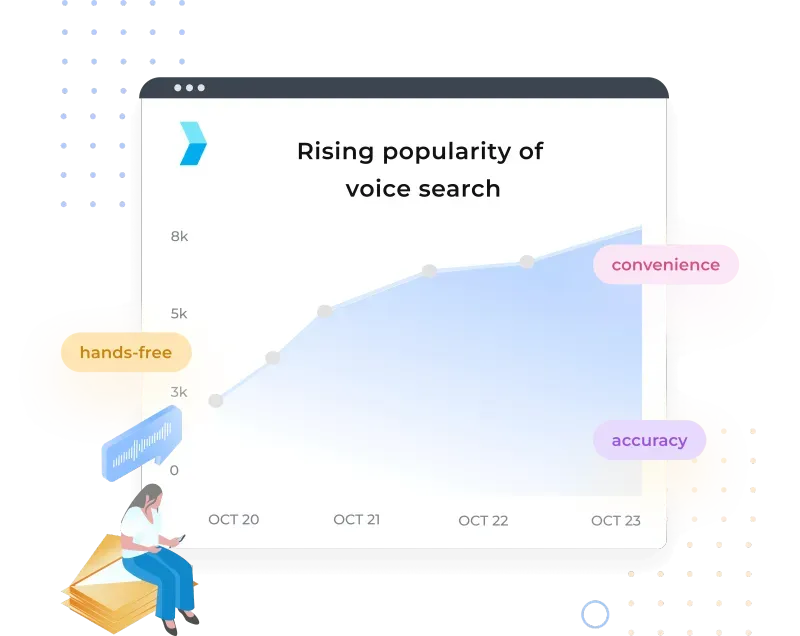
"Voice Search Optimization: The Next Big Thing in SEO"
Introduction: A Shift in How People Search
Gone are the days when search queries were limited to short keywords typed into a search engine. With the rise of smart assistants like Siri, Alexa, Google Assistant, and Cortana, users now interact with technology in a more natural, conversational manner. This evolution is reshaping the SEO landscape, making voice search not just a convenience — but a necessity for digital marketers.
What is Voice Search?

Voice search refers to the technology that allows users to perform searches on the internet by speaking into a device instead of typing. This feature is commonly used on smartphones, smart speakers, and wearable tech.
Why Voice Search is Gaining Popularity

Rapid Adoption of Smart Devices
The surge in smartphone and smart speaker usage has dramatically influenced how people search online. According to Statista, more than 4.2 billion digital voice assistants are being used globally — a number projected to continue growing.
Convenience and Speed
Voice search is faster and more convenient than typing:
Hands-free usage is ideal while driving or cooking.
Users can ask complex questions without needing to spell or type.
Natural and Conversational Search Patterns
People speak differently than they type. Voice queries tend to:
Be longer and more detailed
Use natural language
Include question-based phrases (e.g., “What is the best digital marketing tool?”)
How Voice Search is Transforming SEO

Voice search optimization requires a different SEO mindset. Here’s how:
🔑 1. Natural Language and Long-Tail Keywords
Voice searches are more conversational. Users often phrase queries like:
“How do I optimize my website for Google?”
“What’s the weather like in Mumbai today?”
SEO Tip: Optimize your content with long-tail keywords and natural-sounding language. Focus on phrases your target audience would speak, not just type.
📌 2. Importance of Featured Snippets
Most voice assistants read results from featured snippets or position zero in search engine results.
SEO Tip: Use structured formatting like:
Short, clear answers
Bullet points and lists
Q&A style content
This helps search engines easily extract answers from your content.
📍 3. Emphasis on Local SEO
Voice search is hyper-local. People commonly use voice for finding nearby businesses:
“Pizza place near me”
“Best salon open now in Andheri”
SEO Tip:
Optimize your Google Business Profile.
Use location-specific keywords.
Ensure your NAP (Name, Address, Phone) details are consistent across the web.
⚡ 4. Speed and Mobile-Friendliness
Speed matters more than ever in voice search. Google prioritizes fast-loading, mobile-friendly websites for voice queries.
SEO Tip:
Compress images and files
Use responsive design
Avoid intrusive pop-ups
Test your site using Google PageSpeed Insights
How to Optimize Your Website for Voice Search
Let’s break down actionable strategies to stay ahead of the curve:
✅ 1. Use Conversational Language in Content
Think about how people speak, not just how they type.
Example:
Instead of “digital marketing tips,” use “What are the best digital marketing tips for small businesses?”
✅ 2. Create an FAQ Section
An FAQ section helps match voice queries directly with your content.
Pro Tip: Answer specific questions your target audience might ask. Use tools like:
Answer the Public
People Also Ask in Google
AlsoAsked.com
✅ 3. Optimize for Local Voice Searches
Include local landmarks, neighborhood names, and “near me” keywords in your copy.
Example:
“Our bakery near Connaught Place, Delhi, offers freshly baked goods every morning.”
✅ 4. Improve Technical SEO and Site Speed
Page speed is a major ranking factor for voice searches.
Use:
Google PageSpeed Insights
GTMetrix
Mobile-Friendly Test by Google
✅ 5. Use Schema Markup
Schema helps search engines understand your content contextually, making it more likely to be featured in rich results and voice responses.
Types of schema to use:
FAQ Schema
Local Business Schema
Article or Blog Schema
Future of Voice Search in SEO
The integration of AI and natural language processing is making voice search smarter every day. As adoption grows, voice-first SEO will become a standard practice.
📌 Predictions:
By 2026, over 50% of all web searches will be voice-based.
Brands that fail to optimize for voice risk falling behind competitors.
Voice shopping is expected to grow into a $40B industry by 2026.
Final Takeaway
Voice search is not just a passing trend — it’s a fundamental shift in digital behavior. Whether you’re a blogger, local business owner, or e-commerce brand, now is the time to adapt your SEO strategy for voice. Doing so will:
Enhance user experience
Improve rankings
Drive more targeted, high-converting traffic

